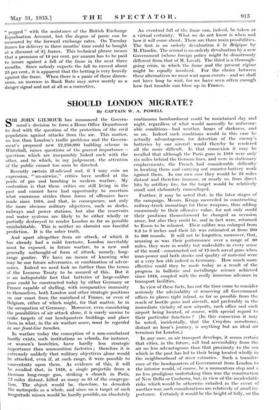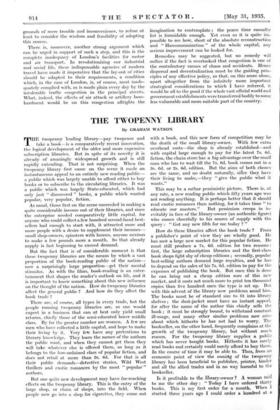SHOULD LONDON MIGRATE
By CAPTAIN W. A. POWELL
SIR JOHN GILMOUR has announced the Govern- ment's decision to form a Home Office Department to deal with the question of the protection of the civil population against attacks from the air. This matter, no less than London's traffic problems and the Govern- ment's proposed new £2,250,000 building scheme in Whitehall, raises questions of the gravest importance— questions which are inseparably linked each with the other, and to which, in my judgement, the attention of the public cannot too soon be directed.
Recently certain ill-advised and, if I may coin an expression, " un-airwise," critics have scoffed at the perils of gas and bombing in modern warfare. My contention is that these critics are still living in the past and cannot have had opportunity to ascertain what enormous strides those forms of offensive have made since 1918, and that, in consequence, not only the more obvious military objectives, such as docks, railways and power stations, but also the reservoirs and water systems are likely to be either wholly or partially destroyed to render London as far as possible uninhabitable. This is neither an alarmist nor fanciful prediction. It is the sober truth.
And apart altogether from air attack, of which it has already had a mild foretaste, London inevitably must be exposed, in future warfare, to a new and generally unthought-of form of attack, namely, long- range gunfire. We have no means of knowing who may be our future adversaries, or combination of adver- saries. Indeed we need look no further than the terms of the Locarno Treaty to be assured of this. But it is an indisputable fact that batteries of large-calibre guns could be constructed today by either Germany or France capable of shelling, with comparative immunity to themselves, both London and other strategic positions on our coast from the mainland of France, or even of Belgium, either of, which might, for that matter, be in the occupation of Germany. Moreover, even considering the pOssibilities of air attack alone, it is surely unwise to make targets of our headquarters buildings and place them in what, in the air warfare sense, must be regarded as our front-line trenches.
In warfare today the conception of a non-combatant hardly exists, such institutions as schools, for instance, or women's hostelries, have hardly less strategic importance than ammunition factories ; therefore it is extremely unlikely that military objectives alone would be, attacked, even if, at such range, it were possible to concentrate upon them. As evidence of this, it will be recalled that, in 1918, a single projectile from a German long7rane gun, striking a church in Paris, 75 miles distant, killed as many as 65 of the congrega- tion. The object would be, , therefore, to demolish the metropolis as a whole, and since on a target of such Magnitude misses would be hardly possible, an absolutely continuous bombardment could be maintained day and night, regardless of what would normally be unfavour- able conditions—bad weather, hours of darkness, and so on. Indeed such conditions would in this case be actually advantageous, for detection of the enemy's batteries by our aircraft would thereby be rendered all the more difficult. In that. connexion it may be recalled that although the Paris guns in 1918 were only six miles behind the German lines, and were in stationary emplacements, the French had considerable difficulty in locating them and carrying out counter-battery work against them. In our own case they would be 23 miles distant and therefore immune, or nearly so, from direct hits by artillery fire, for the target would be relatively small and elaborately camouflaged.
Further, it may be noted that, in the later stages of the campaign, Messrs. Krupp succeeded in constructing railway-truck mountings for these weapons, thus adding enormously to their offensive value, for not only could their positions thenceforward be changed as occasion arose, but also they could be, and in fact were, returned to Essen to be rebored. Their calibre was enlarged from 8.3 to 9 inches and their life was estimated at from 200 to 300 rounds. It will not be forgotten, moreover, that, • amazing as was their performance over a range of 80 miles, they were in reality but makeshifts in every sense of the word—conStructed out of 15-inch naval guns when man-power and both stocks and quality of material were at a very low ebb indeed in Germany. How much more effective could they be made today as a result of the progress in ballistic and metallurgic science achieved since 1918, coupled with the really immense advance in transport facilities.
In view of these facts, has not the time come to consider seriously the advisability of removing all Government offices to places right inland, as far as possible from the reach of hostile guns and aircraft, and preferably in the immediate vicinity of new airports, each office and each airport being located, of course, with special regard to their particular functions ? (In this connexion it may be noted, incidentally, that the Croydon aerodrome, distant an hour's journey, is anything but an ideal air 'terminus for London.) In any case, as air transport develops, it seems certain that cities, in the future, will find accessibility from the air no less advantageous than that proximity to the sea which in the past has led to their being located wholly in the neighbourhood of river estuaries., Such a transfer- ence of the headquarters of Government from London to the interior would,' of course, be a momentous step and a no less prodigious undertaking than was the construction of New Delhi or Canberra, but, in view of the incalculable risks which would be otherwise entailed in the event of another war, such considerations are relatively of small im- portance. Certainly it would be the height of folly, on the grounds of mere trouble and inconvenience, to refuse at least to consider the wisdom and feasibility of adopting this course.
There is, moreover, another strong argument which can be urged in support of such a step, and this is the complete inadequacy of London's facilities for motor and air transport. In revolutionizing our industrial and social life, these indispensable agencies of modern travel have made it imperative that the lay-out of cities should be adapted to their requirements, a condition which, in the case of London, is, of course, most inade- quately complied with, as is made plain every day by the intolerable traffic congestion in the principal streets. What, indeed, the effects of air attack or artillery bom- bardment would be on this congestion affrights the imagination to contemplate ; the peace time casualty list is formidable enough, Yet even so it is quite im- possible to see how, short of the absolute reconstruction and " Haussmannization " of the whole capital, any serious improvement can be looked for.
Remedies may be suggested, but no remedy will suffice if the fact is overlooked that congestion is one of the contributory causes of chaos and accidents. Hence dispersal and decentralization must be the guiding prin- ciples of any effective policy, so that, on this score alone, apart altogether from the infinitely more important strategical considerations to which I have referred, it would be all to the good if the whole vast official world and government establishments were transferred bodily to some less vulnerable and more suitable part of the country:



























































 Previous page
Previous page